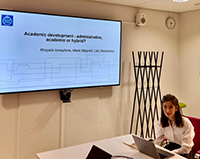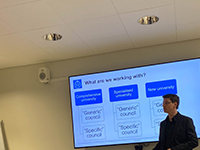Aim
The project comprises a series of three workshops aimed at fostering networking opportunities among junior colleagues hailing from the Nordic countries. With a budget allocation of 421,442 NOK, these workshops will facilitate scientific collaboration and exchange. The organisation and execution of these workshops will be undertaken by early career researchers, who will receive guidance and mentorship from senior colleagues.
This initiative adopts a Nordic approach to investigate transitions in higher education, thereby fostering a critical mass of researchers dedicated to organizing high-quality workshops for early career scholars. Additionally, it contributes to the ongoing institutionalization process of co-supervision for talented PhD students. By doing so, it creates an additional avenue for developing a consortium of higher education research within the Nordic region.
A tangible outcome of this project will be the production of an edited volume or a special issue. This publication will be based on the articles generated during the workshops, showcasing the collaborative efforts and research outputs of the participating researchers. Furthermore, the project aims to submit a joint research project funding application, reinforcing the potential for sustained collaboration and future research endeavors among the Nordic consortium in higher education research.
Workshops
The workshops will be organized as two-day onsite events, accommodating approximately four visitors per workshop per partner institution. Each institution is responsible for arranging a keynote speaker for their respective workshop. With a total of 25 participants in each workshop, there will be a cumulative total of 75 participants. It should be noted that some participants may attend more than one workshop.
The participants will consist of a diverse range of individuals, including early-career scholars such as PhD students and postdocs, mid-career academics including associate professors and senior researchers, as well as late-career scholars such as full professors and emeriti. Additionally, there will be representation from industry practitioners and policymakers. The estimated breakdown of participants per workshop is approximately 8 PhD students, 6 early-career scholars, 3 mid-career scholars, 3 late-career scholars, and 5 industry practitioners and policymakers.
Deliverables
The project's key deliverables consist of a peer-reviewed edited book collection, emphasizing hybrid arrangements in Nordic higher education. This collection will be published with a reputable international publisher, such as Routledge, Palgrave, or Brill. Additionally, there will be policy and media outputs, including public summaries of the workshops shared on social media, a policy brief tailored for policymakers and practitioners (derived from the book collection), and various other media outputs like blog posts and opinion pieces in relevant magazines and general media.


